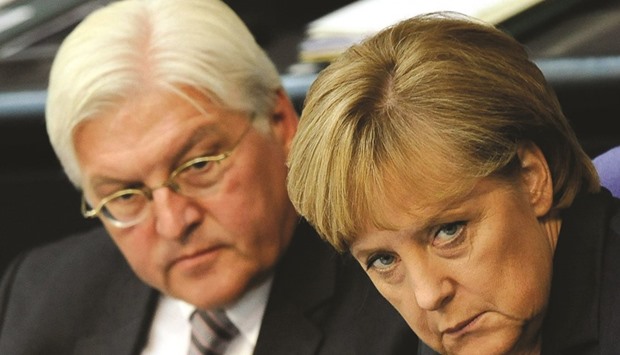Chancellor Angela Merkel’s conservatives agreed yesterday to back Social Democrat Frank-Walter Steinmeier as Germany’s next president, creating a vacancy at the foreign ministry at a critical moment in relations with Russia and the United States.
Merkel’s camp had hoped to promote its own candidate but chose to back political rival Steinmeier for the largely ceremonial post to avoid a long fight with his party, its partner in the ruling “grand coalition”.
Steinmeier, who called Republican Donald Trump a “preacher of hate” before the US election, said yesterday that he hoped the president-elect would change course upon entering office and recognise that “the world is more complex, that climate change is real and that Nato is not superfluous”.
Merkel said that Steinmeier was excellently suited to be head of state.
“At a time when there’s unrest and instability around the world, sending a signal of stability – and so the conservatives supporting Steinmeier’s candidacy – is in my view right and important,” she said.
The chancellor’s desire to show a unified front gained new urgency after the election of Trump, at a time when anti-establishment parties are taking root across Europe and the anti-immigrant Alternative for Germany (AfD) has made rapid gains.
The next foreign minister will have an overflowing in-tray as Germany tries to unite a divided post-Brexit European Union, contain an assertive Russia and work out a new relationship with Washington under Trump.
Media reports have tipped European Parliament President Martin Schulz as a candidate.
Schulz has in recent weeks criticised Turkey over human rights and taken a firm line towards Britain over its pending departure from the EU.
Last week he said he hoped for “rational co-operation” with Trump, whom he had previously described as “not only a problem for the EU but also for the whole world”.
Yesterday’s decision paves the way for Steinmeier to be elected on February 12 to the post now held by Joachim Gauck, a Lutheran pastor who made his mark as an anti-communist leader in the former East Germany.
Both of Gauck’s predecessors in the job had resigned, creating headaches for Merkel.
Steinmeier, in his first interview after the news, said he worried about the rise of populist candidates in the United States and across Europe, with their anti-immigrant and nationalist rhetoric, mistrust of the media, and isolationism.
“I see all those trends here at home too,” he told a website run by the Bild newspaper. “We have to pay close attention, and my appeal is clear: we must nip it in the bud.”
Steinmeier is liked and respected in Germany despite losing out as the SPD’s chancellor candidate in 2009.
His popularity surged in 2010 when he took a break from politics to donate a kidney to his wife.
Gauck’s term expires in March, six months before parliamentary elections.
Merkel, 62, is widely expected to run for a fourth term as chancellor, and a poll last week showed more than half of Germans want her to do so.
Steinmeier raised concerns among US and Nato officials earlier this year when he said Western military exercises in eastern Europe could be seen as “sabre-rattling” against Russia.
He has pushed hard to end fighting between Ukrainian forces and Russian-backed separatists in eastern Ukraine, and condemned Russia’s 2014 annexation of Crimea.
At the same time, he backs continued dialogue with Russia, a view shared by Trump.
The president is not directly elected by the people, but rather by the Federal Convention, an assembly of members of the federal parliament and delegates from state parliaments.

Merkel and Steinmeier: the chancellor has said that Steinmeier is suited to be head of state.
